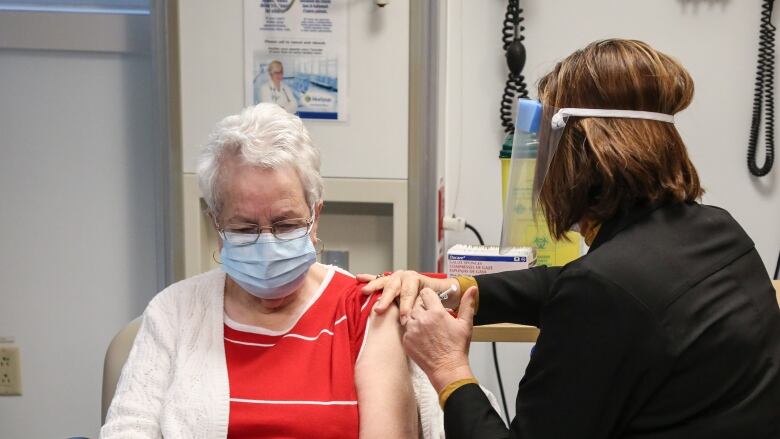N.B. says it's finalizing plans for COVID vaccination reporting
Data analysts say publishing numbers could inspire hope and trust

Fredericton based data analyst Ray Harris has a knack for presenting complicated data in ways that makes it easy to grasp and he says public health could do the same.
"Instead of having to browse a spreadsheet to see how many vaccines New Brunswick issued over the Christmas break compared to other provinces, you could make [charts that pop] so you can look at it and digest it easily."
Recently, Harris posted a tweet showing that, as of Jan.3, New Brunswick has administered 2905 of the 8250 doses it hasreceived, or the equivalent of 35.2 per cent.
It was also easy to see that only Alberta (37.4 per cent) and PEI (38.2 per cent) have done better.
Harris said these are some of the most encouraging numbers since the start of the pandemic and there's a public hunger to see them.
"Without reporting on the progress of vaccination, no one knows how close we are."

"Now there's an opportunity to provide a sense of optimism to people and say, 'You know what, 75 per cent of the doses we've received, we've issued them. We're putting these out as quickly as we can," said Harris.
"Your mom or your grandmother or your sister, who's a nurse, is 20 days away from being partially vaccinated. That's good information for you to have because it gives you peace of mind."
New BrunswickPublic Health has yet to add vaccination tracking to its online dashboard.
So far, updates have been provided by news conference or in response to media requests.
In an email, Department of Health spokesperson Bruce Macfarlanesaid the province is finalizing its plans to provide public reports of vaccination numbers. He did not say when public reporting might begin.

Meanwhile, Ontario is posting daily updates.
They show how many doses were administered as of 8 p.m. the previous day, how many doses were administered in total, and how many vaccinations are considered complete because individuals have received both doses.
In the absence of provincial reporting, some academics have worked to fill the information gap.
University of Toronto epidemiology researcher JeanPaul Soucy is the co-founder of the COVID-19 Open Data Working Group.
It combs media reports and listens to news conferences and then posts the information online.
"I think the number one reason, honestly, is that it kind of shows that light at the end of the tunnel, right?" said Soucy.

"And I guess the number two reason is for the public to evaluate how the rollout is actually going."
"We can compare to that our peer countries, with Israel being the gold standard at the moment. If we're not administering vaccine as quickly as they are, maybe we have something to learn."
Harris said he's curious to know everything about how vaccine is being administered in his home province.
"I'm a data guy. I want to see by postal code who's been vaccinated and what their ages are. And I think that's a lot to ask. I think that's way too much to ask," said Harris acknowledging that the province also has to consider protecting patient privacy.
"But I don't think that region and age group is too much to ask," he said.
Harris said New Brunswickers should be able to see for themselves whether vaccines are being distributed evenly and fairly in every region and across linguistic divides.
"Are people in Zone two being treated fairly compared to people in Zone four?" he asked.
He saidpublic reporting could instill public trust that the system is working as well as it can.












_(720p).jpg)


 OFFICIAL HD MUSIC VIDEO.jpg)
.jpg)



























































































